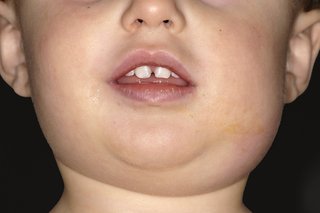Can You Get Mumps Again if You Had It as a Child
Mumps is a contagious viral infection that used to be common in children before the introduction of the MMR vaccine.
Symptoms of mumps
Mumps is well-nigh recognisable past the painful swellings in the side of the confront under the ears (the parotid glands), giving a person with mumps a distinctive "hamster face up" appearance.

Other symptoms of mumps include headaches, joint pain, and a high temperature, which may develop a few days before the swelling of the parotid glands.
Important: Coronavirus (COVID-19)
At the moment it tin can exist hard to know what to do if your child is unwell.
It's important to trust your instincts and get medical assistance if you need information technology.
When to encounter a GP
It's important to contact a GP if you suspect mumps so a diagnosis tin can exist made.
While mumps is not normally serious, the condition has similar symptoms to more serious types of infection, such equally glandular fever and tonsillitis.
Your GP can usually brand a diagnosis later on seeing and feeling the swelling, looking at the position of the tonsils in the rima oris and checking the person's temperature to meet if it's higher than normal.
Let your GP know in advance if you lot're coming to the surgery so they can take whatsoever necessary precautions to prevent the spread of infection.
If your GP suspects mumps, they should notify your local health protection team (HPT). The HPT will accommodate for a sample of saliva to be tested to confirm or rule out the diagnosis.
Find your local health protection team on GOV.UK
How mumps is spread
Mumps is spread in the same fashion as colds and influenza: through infected aerosol of saliva that can be inhaled or picked up from surfaces and transferred into the mouth or nose.
A person is most contagious a few days before the symptoms develop and for a few days afterwards.
During this fourth dimension, it's of import to prevent the infection spreading to others, particularly teenagers and young adults who have non been vaccinated.
If you have mumps, you can help prevent it spreading by:
- regularly washing your easily with lather
- using and disposing of tissues when y'all sneeze
- avoiding schoolhouse or piece of work for at least v days after your symptoms first develop
Preventing mumps
You can protect your child against mumps past making sure they're given the combined MMR vaccine for mumps, measles and rubella.
The MMR vaccine is part of the routine NHS childhood immunisation schedule.
Your child should exist given 1 dose when they're effectually 12 to xiii months and a second booster dose at 3 years and iv months.
Once both doses are given, the vaccine provides around 88% protection against mumps.
Anyone who did not accept both doses of the MMR vaccine as a child can contact a GP to arrange to be vaccinated.
Handling for mumps
There's currently no cure for mumps, but the infection should pass within 1 or ii weeks.
Treatment is used to relieve symptoms and includes:
- getting plenty of bed remainder and fluids
- using painkillers, such as ibuprofen and paracetamol – aspirin should not be given to children under xvi
- applying a warm or cool compress to the bloated glands to help relieve pain
Complications
Mumps usually passes without causing serious harm to a person's wellness. Serious complications are rare.
But mumps tin pb to viral meningitis if the virus moves into the outer layer of the encephalon.
Other complications include swelling of the testicles or ovaries (if the afflicted person has gone through puberty).
Find out more nigh the complications of mumps
Who'due south affected
Most cases of mumps occur in younger adults who did not receive the MMR vaccine as role of their childhood vaccination schedule and did not accept mumps equally a child.
Older adults who were born in the Britain before the vaccine was introduced are likely to have had mumps equally a kid. Once you have been infected by the mumps virus, you unremarkably develop a life-long immunity to farther infection.
The MMR vaccine was introduced in 1988. Adults born between 1980 and 1990 may not have been vaccinated equally children, and are less likely than older adults to accept had mumps every bit a child.
Mumps is currently most common among people born in the tardily 1990s and early 2000s who missed out on the MMR vaccine as children.
Folio last reviewed: 24 September 2021
Next review due: 24 September 2024
Source: https://www.nhs.uk/conditions/mumps/
0 Response to "Can You Get Mumps Again if You Had It as a Child"
Post a Comment